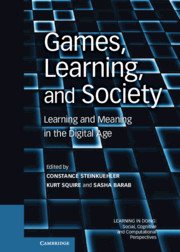Book contents
- Frontmatter
- Contents
- Contributors
- Series Foreword
- Foreword
- Acknowledgments
- Section I Games as Designed Experience
- Section II Games as Emergent Culture
- Section III Games as Twenty-First-Century Curriculum
- 17 Introduction to Section III
- 18 Prediction and Explanation as Design Mechanics in Conceptually Integrated Digital Games to Help Players Articulate the Tacit Understandings They Build through Game Play
- 19 Game-Based Curricula, Personal Engagement, and the Modern Prometheus Design Project
- 20 Discovering Familiar Places
- 21 Developing Gaming Fluencies with Scratch
- 22 “Freakin’ Hard”
- 23 Models of Situated Action
- Afterword Games and the Future of Education Research
- Index
- References
19 - Game-Based Curricula, Personal Engagement, and the Modern Prometheus Design Project
Published online by Cambridge University Press: 05 August 2012
- Frontmatter
- Contents
- Contributors
- Series Foreword
- Foreword
- Acknowledgments
- Section I Games as Designed Experience
- Section II Games as Emergent Culture
- Section III Games as Twenty-First-Century Curriculum
- 17 Introduction to Section III
- 18 Prediction and Explanation as Design Mechanics in Conceptually Integrated Digital Games to Help Players Articulate the Tacit Understandings They Build through Game Play
- 19 Game-Based Curricula, Personal Engagement, and the Modern Prometheus Design Project
- 20 Discovering Familiar Places
- 21 Developing Gaming Fluencies with Scratch
- 22 “Freakin’ Hard”
- 23 Models of Situated Action
- Afterword Games and the Future of Education Research
- Index
- References
Summary
Once understood in the context of the narratives that give it meaning,law becomes not merely a system of rules to be observed, but a world inwhich to live.
—Bruner, 1990, p. xWe have reached a challenging junction at which, on the one hand, teachersand schools face increased pressure to prepare students for standardizedtests, whereas, on the other hand, they face a generation of students whoregard the school curriculum as largely irrelevant to their own lives. Ithas become all too common to develop curricula and teach domain contentdistinct from the people, places, and situations through which the contenthas meaning. While it is expected that the information learned will somehow,later, be connected to those situations in which it is useful andmeaningful, this is rarely what occurs. All too often the knowledge students“acquire” in schools remains inert (Whitehead, 1929),something demonstrated on a test in a school context where it can be tradedfor a grade but not applied to a situation in which it has intrinsic worth(Lave, 1991, 1997; Wenger, 1998).
The irony is that we then wonder why children appear unmotivated to learnafter we have disconnected meaning from the learning situation, assumingthat the learner somehow will attribute the same functional value to theinformation as the teacher does
[Barab & Roth, 2006, p. 3].Unless we begin to engage youth in rich situations that add meaning todisciplinary concepts – as part of the learning process – thecontent of schools will be perceived as a thing to be acquired and exchangedfor a test score (having exchange value) and not as auseful tool that has direct functional value in the world or to thelearner.
Information
- Type
- Chapter
- Information
- Games, Learning, and SocietyLearning and Meaning in the Digital Age, pp. 306 - 326Publisher: Cambridge University PressPrint publication year: 2012
References
Accessibility standard: Unknown
Why this information is here
This section outlines the accessibility features of this content - including support for screen readers, full keyboard navigation and high-contrast display options. This may not be relevant for you.Accessibility Information
- 3
- Cited by
